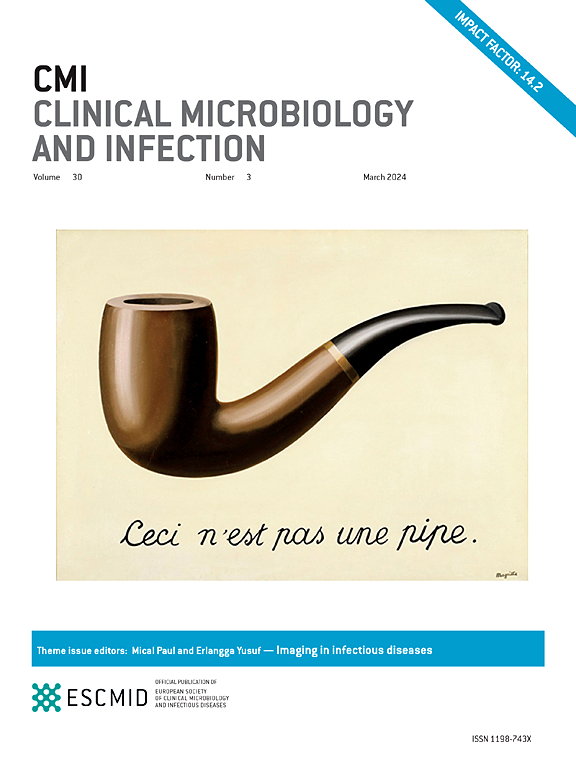European society of clinical microbiology and infectious diseases guidelines for antimicrobial stewardship in emergency departments (endorsed by European association of hospital pharmacists)
IF 8.5
1区 医学
Q1 INFECTIOUS DISEASES
引用次数: 0
Abstract
Scope
This European Society of Clinical Microbiology and Infectious Diseases guideline provides evidence-based recommendations to support a selection of appropriate antibiotic use practices for patients seen in the emergency department (ED) and guidance for their implementation. The topics addressed in this guideline are (a) Do biomarkers or rapid pathogen tests improve antibiotic prescribing and/or clinical outcomes? (b) Does taking blood cultures in common infectious syndromes improve antibiotic prescribing and/or clinical outcomes? (c) Does watchful waiting without antibacterial therapy or with delayed antibiotic prescribing reduce antibiotic prescribing without worsening clinical outcomes in patients with specific infectious syndromes? (d) Do structured culture follow-up programs in patients discharged from the ED with cultures pending improve antibiotic prescribing?
Methods
An expert panel was convened by European Society of Clinical Microbiology and Infectious Diseases and the guideline chair. The panel selected in consensus the four most relevant antimicrobial stewardship topics according to pre-defined relevance criteria. For each main question for the four topics, a systematic review was performed, including randomized controlled trials and observational studies. Both clinical outcomes and stewardship process outcomes related to antibiotic use were deemed relevant. The literature searches were conducted between May 2021 and March 2022. In April 2022, the panel members were formally asked to suggest additional studies that were not identified in the initial searches. Data were summarized in a meta-analysis if possible or otherwise summarized narratively. The certainty of the evidence was classified according to the Grading of Recommendations Assessment, Development and Evaluation criteria. The guideline panel reviewed the evidence per topic critically appraising the evidence and formulated recommendations through a consensus-based process. The strength of the recommendations was classified as strong or weak. To substantiate the implementation process, implementation trials or observational studies describing facilitators/barriers for implementation were identified from the same searches and were summarized narratively.
Recommendations
The recommendations on the use of biomarkers and rapid pathogen diagnostic tests focus on the initiation of antibiotics in patients admitted through the ED. Their effect on the discontinuation or de-escalation of antibiotics during hospital stay was not reported, neither was their effect on hospital infection prevention and control practices. The recommendations on watchful waiting (i.e. withholding antibiotics with some form of follow-up) focus on specific infectious syndromes for which the primary care literature was also included. The recommendations on blood cultures focus on the indication in three common infectious syndromes in the ED explicitly excluding patients with sepsis or septic shock. Most recommendations are based on very low and low certainty of evidence, leading to weak recommendations or, when no evidence was available, to best practice statements. Implementation of these recommendations needs to be adapted to the specific settings and circumstances of the ED. The scarcity of high-quality studies in the area of antimicrobial stewardship in the ED highlights the need for future research in this field.
欧洲临床微生物学和传染病学会(ESCMID)急诊科抗菌药物管理指南(欧洲医院药剂师协会认可)。
范围:本 ESCMID 指南提供了以证据为基础的建议,以支持为急诊科 (ED) 患者选择适当的抗生素使用方法,并为其实施提供指导。本指南涉及的主题包括1) 生物标记物或快速病原体检测是否能改善抗生素处方和/或临床结果?2)在常见感染综合征中进行血液培养是否能改善抗生素处方和/或临床疗效?3)在没有抗菌治疗或延迟抗生素处方的情况下,观察等待是否会减少抗生素处方而不恶化特定感染综合征患者的临床预后?4)对于从急诊室出院且培养结果待定的患者,结构化培养随访计划是否能改善抗生素处方?ESCMID 和指南主席召集了一个专家小组。专家组根据预先确定的相关性标准,一致选出了四个最相关的 AMS 主题。针对这四个主题的每个主要问题进行了系统性回顾,包括随机对照试验和观察性研究。与抗生素使用相关的临床结果和管理过程结果都被认为是相关的。文献检索在 2021 年 5 月至 2022 年 3 月期间进行。2022 年 4 月,专家组成员被正式要求就最初搜索中未发现的其他研究提出建议。在可能的情况下,对数据进行了荟萃分析或其他叙述性总结。证据的确定性根据建议评估、制定和评价分级(GRADE)标准进行分类。指南小组对每个主题的证据进行了严格评估,并通过基于共识的程序制定了建议。建议的力度分为强和弱两类。为证实实施过程,从相同的检索中确定了描述实施的促进因素/障碍的实施试验或观察性研究,并对其进行了叙述性总结:关于使用生物标记物和快速病原体诊断检测的建议主要针对通过急诊室入院的患者使用抗生素的情况。它们对住院期间停用或减量使用抗生素的影响未见报道,对医院感染预防和控制措施的影响也未见报道。关于观察等待(即暂停使用抗生素并进行某种形式的随访)的建议主要针对特定的感染综合征,其中也包括初级保健文献。关于血培养的建议主要针对急诊室三种常见感染综合征的适应症,明确排除了败血症或脓毒性休克患者。大多数建议都是基于极低和低确定性的证据提出的,因此建议力度较弱,或者在没有证据的情况下,只提出了最佳实践声明。这些建议的实施需要适应急诊室的具体环境和情况。急诊室抗菌药物管理方面的高质量研究很少,这凸显了该领域未来研究的必要性。
本文章由计算机程序翻译,如有差异,请以英文原文为准。
求助全文
约1分钟内获得全文
求助全文
来源期刊
CiteScore
25.30
自引率
2.10%
发文量
441
审稿时长
2-4 weeks
期刊介绍:
Clinical Microbiology and Infection (CMI) is a monthly journal published by the European Society of Clinical Microbiology and Infectious Diseases. It focuses on peer-reviewed papers covering basic and applied research in microbiology, infectious diseases, virology, parasitology, immunology, and epidemiology as they relate to therapy and diagnostics.

 求助内容:
求助内容: 应助结果提醒方式:
应助结果提醒方式:


